AMD Ryzen 9 7940HS Performance
Instead of going through the entire Linux-Bench test suite, we are going to show a few performance and power numbers here to give a general sense of performance. This also gives us the opportunity to test with Linux/ Ubuntu instead of just Windows.
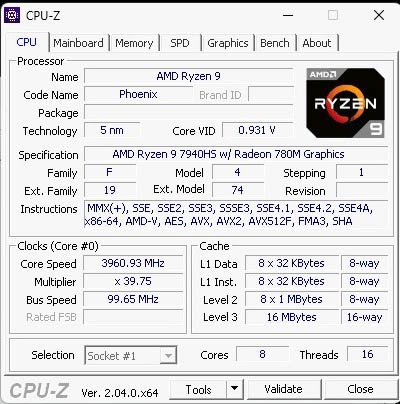
The AMD Ryzen 9 7940HS is fast, but we wanted two pieces of comparison. First, how does it compare to the same CPU in the Minisforum UM790 Pro? Second, how does it compare to the non-Pro version?
Python Linux 4.4.2 Kernel Compile Benchmark
This is one of the most requested benchmarks for STH over the past few years. The task was simple, we have a standard configuration file, the Linux 4.4.2 kernel from kernel.org, and make the standard auto-generated configuration utilizing every thread in the system. We are expressing results in terms of compiles per hour to make the results easier to read:
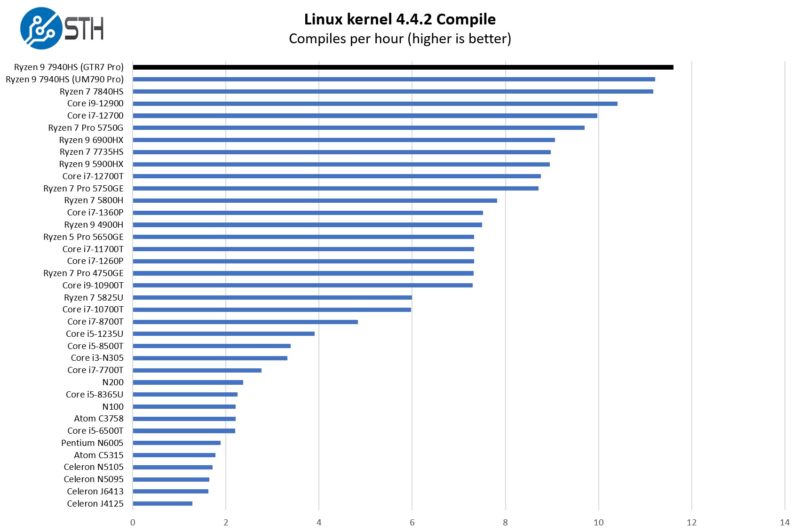
The AMD Ryzen 9 7940HS is a very fast chip. With its Zen 4 architecture, the CPU tops our mini PC charts. Of course, there are faster higher TDP CPUs, but we wanted to focus on more lower-power mini PCs. If you have seen our Project TinyMiniMicro series, we have seen several 1L PCs with 35W TDP CPUs on the charts above use more power than this system.
7-zip Compression Performance
7-zip is a widely used compression/ decompression program that works cross-platform. We started using the program during our early days with Windows testing. It is now part of Linux-Bench.
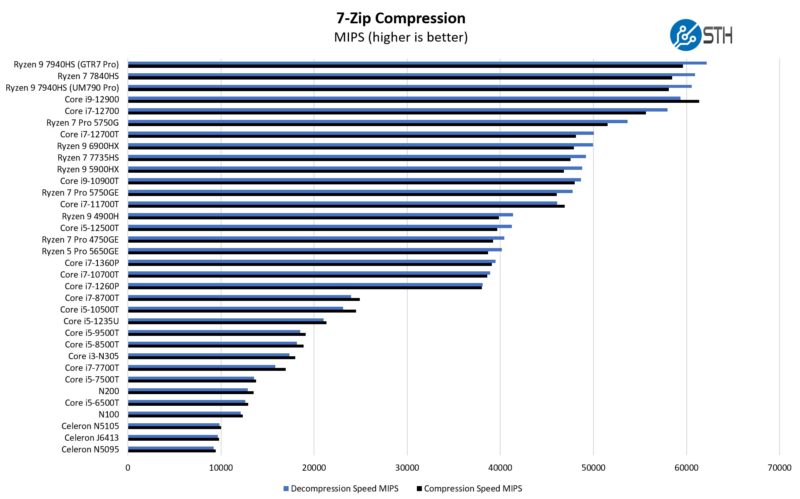
At this point, the Pro and non-Pro versions should be a stark comparison point. We certainly get better performance across the board on the Ryzen 9, but if this is a second PC or an office PC or something like that, I am not sure if the <10% gap is worth the price delta.
OpenSSL Performance
OpenSSL is widely used to secure communications between servers. This is an important protocol in many server stacks. We first look at our sign tests:
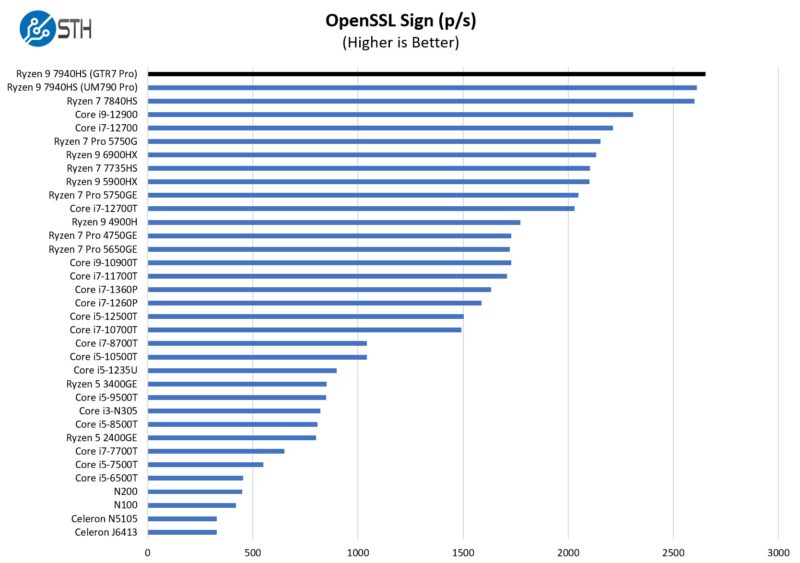
Here are the verify results:
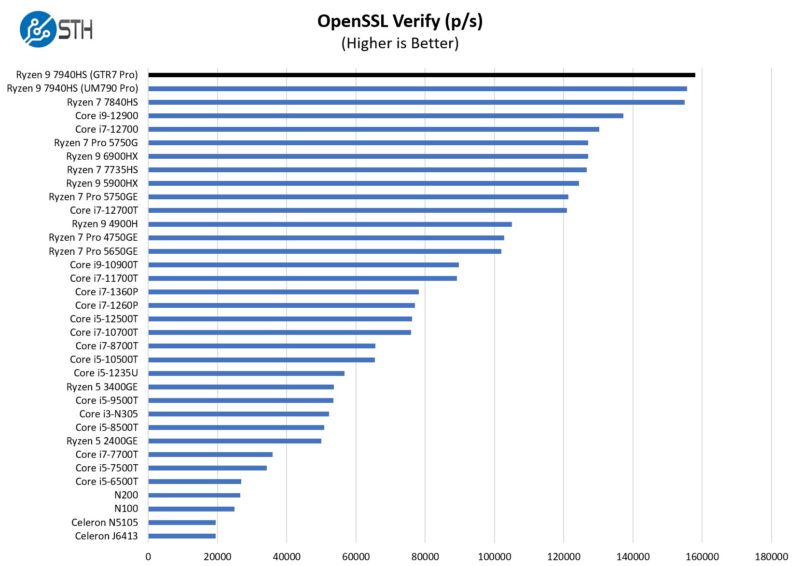
The other eye-opener is that the Beelink happily runs at a higher maximum default power setting than the Minisforum UM790 Pro. As a result, out of the box, Beelink was consistently slightly faster.
Crucial P3 Plus 1TB Performance
We mentioned this earlier, but we just wanted to see how the Crucial P3 Plus performed. It is certainly PCIe Gen4, but it is also not the fastest.
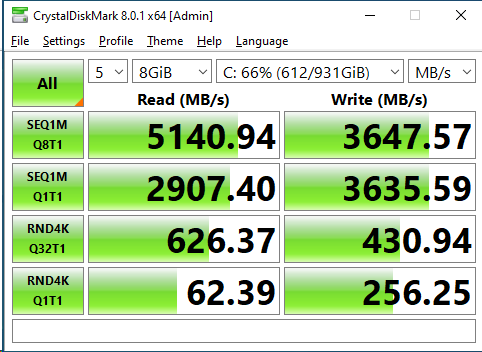
You can find Will’s full Crucial P3 Plus 1TB PCIe Gen4 NVME SSD Review for more detail on that drive. We saw numbers that matched that review performance within a small margin so we are going to say they are the same.
A Word on the AMD RDNA 3 GPU
By far, the biggest update to the mini PC is not the Zen 4 CPU which is still 8 cores/ 16 threads albeit a bit faster than previous generations. Instead, it is the integrated AMD Radeon 780M based on RDNA 3. This is a great example of one of the features we get with the new GPU, the ability to use not just AV1 decode, but also encode.
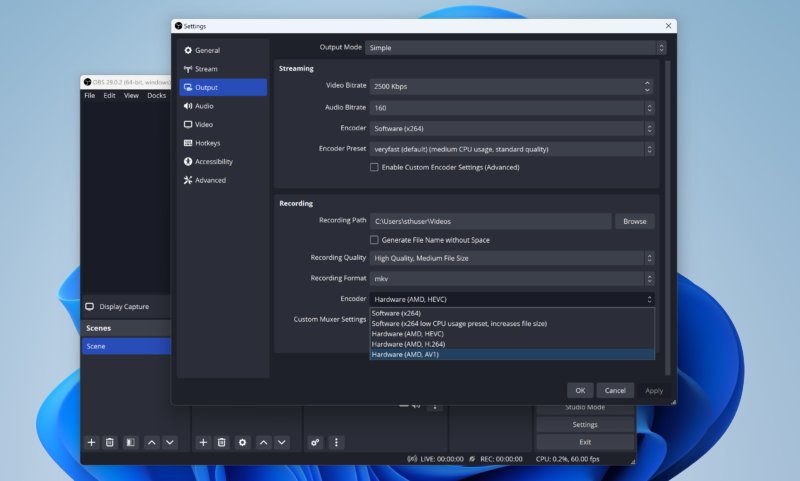
In the video, we show our mini PC League of Legends test that we captured using AV1 encode via OBS.
The League of Legends testing was funny. We use that because folks asked for gaming, and it is a massively popular title that also is within the realm of running on mini PCs. When we started, running 1080p at solid framerates with high settings was just about achievable. To be fair, if one just wants 60fps+ then 4K is great. At 120fps+ we might suggest 1080p or 1440p with maximum quality settings, or just dropping a few settings for 4K.
Geekbench Performance
Geekbench 6 just underwent a 6.1 update that changed numbers. Here is the Pro versus non-Pro on 6.1:
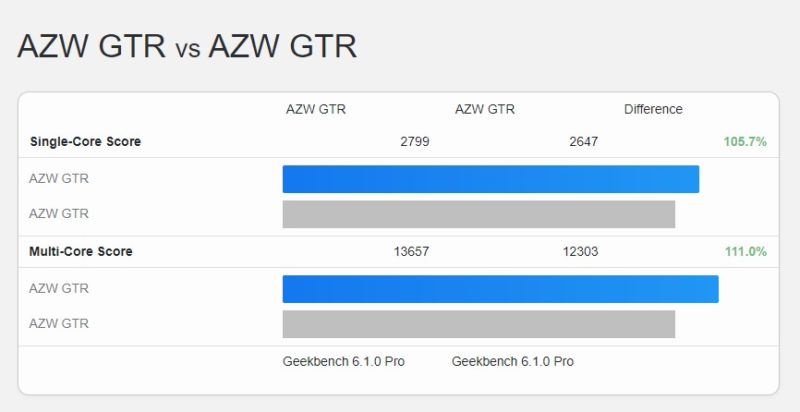
The comparison to the Minisforum UM790 Pro was much closer, but on every side-by-side run we did the Beelink was slightly faster.
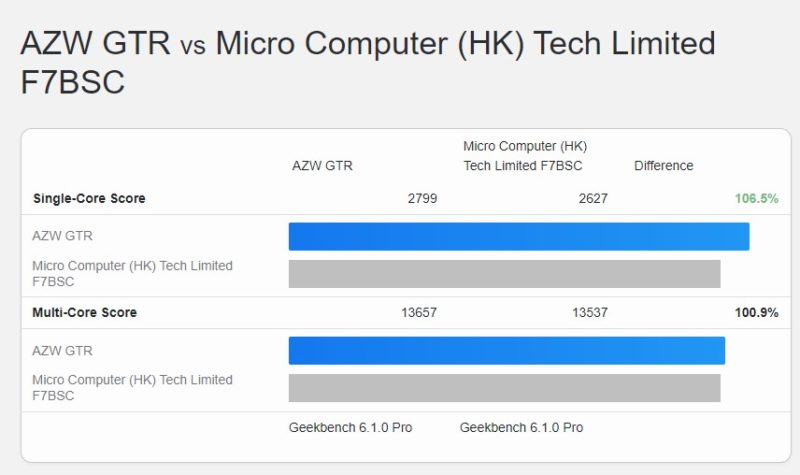
These are the same general trends we saw under Ubuntu carried over to Geekbench on Windows.
Next, let us see how this performance translates to performance and noise.

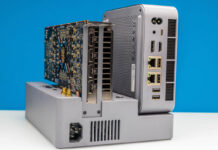
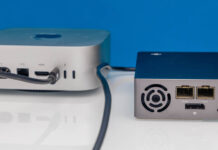
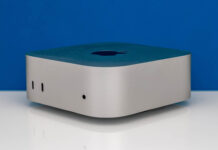
So just wondering: are these usb 4 ports all usable at the same time with the advertised 40gbps speeds? So 1 quick external SSD – 1 eGPU enclosure and 1 usb 4 dock for example without losing any performance.
Still waiting on a 7945(HX or 3DHX) model.
@Jay – Phoenix APU’s have (2) USB4 interfaces in the CPU. So far, AMD provides 16 of PCI Gen 4 lanes to each USB4 controller.
So if this has (4) ports, then 2 ports would have to be sharing the same 16 lane controller.
Unless Patrick or someone on STH knows different, there are no eGPU docks that can saturate a USB4 port. Those TB3 docks use PCIe Gen 3, either 4 lane or 8 lane bridge chips, even if the GPU slot is 16x.
Unfortunately, it’s sold out now.
7940hs is the first cpu I think can hold it’s own in the kind of form factor. I bought a 7940hs notebook several weeks ago. Coming from 5600x & 5900x machines for compiling c++ code, python work, and such. It is a very capable cpu.
AMD should be selling this CPU into the desktop market hard, for mini and full ATX. At 45W or so these are damn compelling processors
Do these support ECC? The chipset looks like it does based on AMD reference, but not sure if these do. Would this make a strong tiny mini micro Proxmox cluster? 2x nvme ssd + 32gb or 64gb ecc RAM seems like it would support zfs ok.
@ Johnson – I think you have to go to the hidden advanced BIOS menu to turn on ECC support.
Does the unit or cpu gets hot quickly under load? Tried their older 5800H model but runs too hot. Thanks
@spuwho Thanks for the answer! Nice to know those docks and eGPU’s can’t really saturate those ports. Sharing the same controller makes lots of sense then.